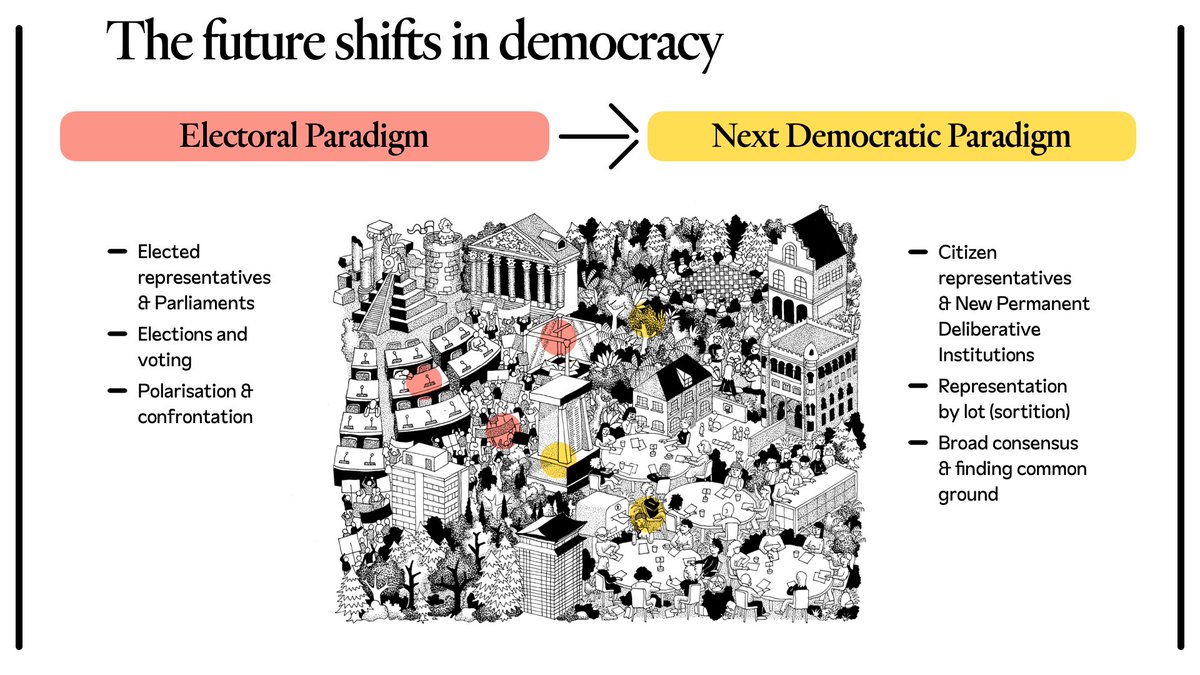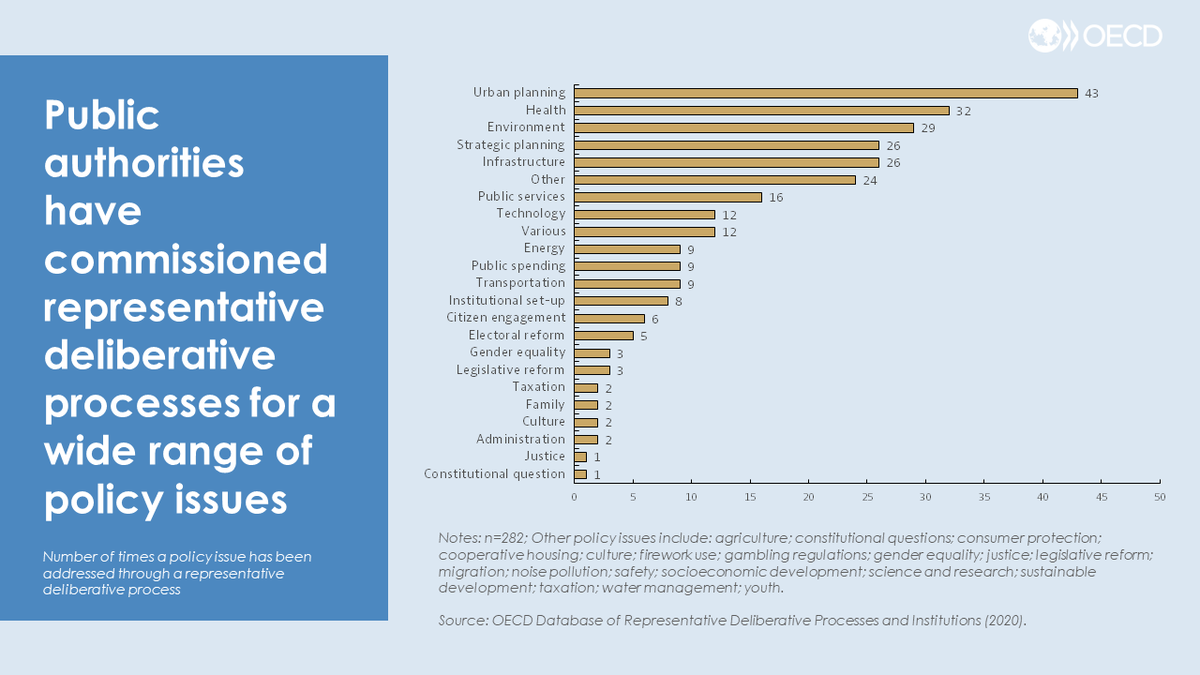
I'm at the @UN today to speak about inspiring examples for the future of democracy ✨
The 1948 UN Declaration on Human Rights anchored the idea that democracy = elections.
But what if elections were *not* the heart of democracy? And this idea is limiting our imagination. A 🧵
The 1948 UN Declaration on Human Rights anchored the idea that democracy = elections.
But what if elections were *not* the heart of democracy? And this idea is limiting our imagination. A 🧵

It is relatively recently that democracy has come to be equated with elections.
The Ancient Greeks knew that elections lead to short-termism and polarisation. They mean only a narrow few have true power. In their words, they create oligarchies.
The Ancient Greeks knew that elections lead to short-termism and polarisation. They mean only a narrow few have true power. In their words, they create oligarchies.
In "On Revolution", Hannah Arendt also highlighted this perversion:
"Representative government has in fact become oligarchic government...
What we today call democracy is a form of government where the few rule."
"Representative government has in fact become oligarchic government...
What we today call democracy is a form of government where the few rule."
When we look back to the French & American revolutions, and the construction of the institutions that have been modelled internationally, the systems that today we call democracies, they were intentionally designed to be oligarchic.
The word democracy was never used.
The word democracy was never used.
Only much later, as suffrage was expanded, did the representative government morph into representative democracy.
Don’t get me wrong: fairly done, this kind of representation was and is an improvement on alternatives: absolute monarchs, monopolies on power or dictatorships.
Don’t get me wrong: fairly done, this kind of representation was and is an improvement on alternatives: absolute monarchs, monopolies on power or dictatorships.
But just because something is more democratic doesn’t make it our ideal democracy.
I think that in the moment of crisis we are living in today, with so many people feeling disillusioned with the system, feeling powerless, we need to question what have become our assumptions.
I think that in the moment of crisis we are living in today, with so many people feeling disillusioned with the system, feeling powerless, we need to question what have become our assumptions.
What if elections weren’t the heart of democracy?
What if we shifted political and legislative power to everyday people?
What if we reintroduced the democratic practice of selecting assemblies by lot (sortition) instead of election?
What if we shifted political and legislative power to everyday people?
What if we reintroduced the democratic practice of selecting assemblies by lot (sortition) instead of election?

We have the evidence and foundations for a genuinely democratic future already being laid.
Before founding @DemNext_ , I established & led the OECD’s work on innovative citizen participation. With @ICesnulaityte, we analysed ~600 examples of citizens’ assemblies around the globe
Before founding @DemNext_ , I established & led the OECD’s work on innovative citizen participation. With @ICesnulaityte, we analysed ~600 examples of citizens’ assemblies around the globe

We developed the OECD's Deliberative Democracy Toolbox with:
➡️ Analysis of what works
➡️ Standards for good practice to ensure citizens' assemblies are effective, legitimate and democratic
➡️ Evaluation guidelines
➡️ Guide for 8 ways to institutionalise
oecd.org/governance/inn…
➡️ Analysis of what works
➡️ Standards for good practice to ensure citizens' assemblies are effective, legitimate and democratic
➡️ Evaluation guidelines
➡️ Guide for 8 ways to institutionalise
oecd.org/governance/inn…

So @DemNext_ is not starting from scratch. We are building on and combining ideas from a growing deliberative wave of over 600 examples of citizens’ assemblies around the world. There are pioneers who have been showing us over and over again that deliberative democracy can work.
In citizens' assemblies, everyday people selected by lottery have proven time and time again that we are able to come together across diversity, grapple with complexity, listen to one another, and to decide together.
I’ve been incredibly inspired by these examples.
#delibwave
I’ve been incredibly inspired by these examples.
#delibwave

Permanent Citizens’ Assemblies exist as well.
With a group convened by @Davidvanrey @G1000org, I was involved in designing the world’s first citizens’ council with people selected by lottery in Ostbelgien, the German-Speaking Community of Belgium in 2019.
medium.com/participo/how-…
With a group convened by @Davidvanrey @G1000org, I was involved in designing the world’s first citizens’ council with people selected by lottery in Ostbelgien, the German-Speaking Community of Belgium in 2019.
medium.com/participo/how-…

Ostbelgien is a small laboratory of 80,000 people. But it inspired Vice Mayor of Paris @AnouchToranian.
I had the privilege of working with a group convened by @FIDEurope to design the permanent Paris Citizens’ Assembly.
noemamag.com/a-movement-tha…
I had the privilege of working with a group convened by @FIDEurope to design the permanent Paris Citizens’ Assembly.
noemamag.com/a-movement-tha…

And most recently, I’m excited that a project I was involved in to design the first permanent Citizens’ Assembly for Climate was announced in the region of Brussels, just last week. #delibwave @G1000org
https://twitter.com/DemNext_/status/1593186903859556355?s=20&t=el3odsPNDb1jdd9O2vS5Ug
Interest in establishing permanent Citizens’ Assemblies is growing.
What I hope is that we move from a situation where they are not just permanent, but also empowered as much as possible ✊
What I hope is that we move from a situation where they are not just permanent, but also empowered as much as possible ✊
At a time when so many feel disillusioned with politics, feel powerless to influence change and are frustrated with the state of our countries and the world, these examples give me hope and inspiration that we could be building a genuinely democratic system.
I believe that many elected officials & public servants share these aspirations. The vast majority of people who go into politics do so wanting make change happen.
We need courageous leaders who are willing to continue experiments from within to re-imagine the political system.
We need courageous leaders who are willing to continue experiments from within to re-imagine the political system.
It’s important that we don’t give in to fatalism and that we channel our energy into enabling change.
Our choices are not limited to looking for yet another saviour within our broken electoral politics, or being tempted by autocracy.
Another democratic future is possible.
Our choices are not limited to looking for yet another saviour within our broken electoral politics, or being tempted by autocracy.
Another democratic future is possible.

We *can* shift political and legislative power towards citizens’ assemblies.
We *can* create a system where we all have equal political rights, taking turns representing and being represented.
We *can* work to establish empowered assemblies with people selected by lottery.
We *can* create a system where we all have equal political rights, taking turns representing and being represented.
We *can* work to establish empowered assemblies with people selected by lottery.
We set up @DemNext_ because we believe that another democratic future is possible.
But we won’t get there alone. We invite you to join us in this mission of shifting power to people and building new institutions for the next democratic paradigm 🙌
demnext.org
But we won’t get there alone. We invite you to join us in this mission of shifting power to people and building new institutions for the next democratic paradigm 🙌
demnext.org
And my recommendations for
@UN in my concluding remarks:
1. We need deliberation at global level. @_GlobalAssembly shows what’s possible.
2. We should update the Declaration of Human Rights to redefine democracy beyond elections. Let’s do it with a Global Citizens’ Assembly.
@UN in my concluding remarks:
1. We need deliberation at global level. @_GlobalAssembly shows what’s possible.
2. We should update the Declaration of Human Rights to redefine democracy beyond elections. Let’s do it with a Global Citizens’ Assembly.
Inspired by both @Davidvanrey, who highlights this point in his excellent “Against Elections”, and @jonjalex who suggests a citizen-led update to the UN Declaration in “Citizens”.
#delibwave #citizens #UNHumanRights @UNHumanRights @demnext_
#delibwave #citizens #UNHumanRights @UNHumanRights @demnext_
• • •
Missing some Tweet in this thread? You can try to
force a refresh







